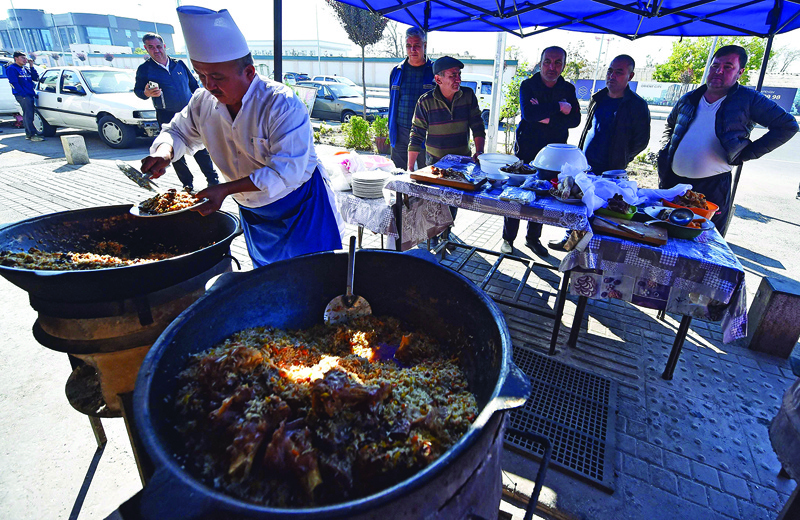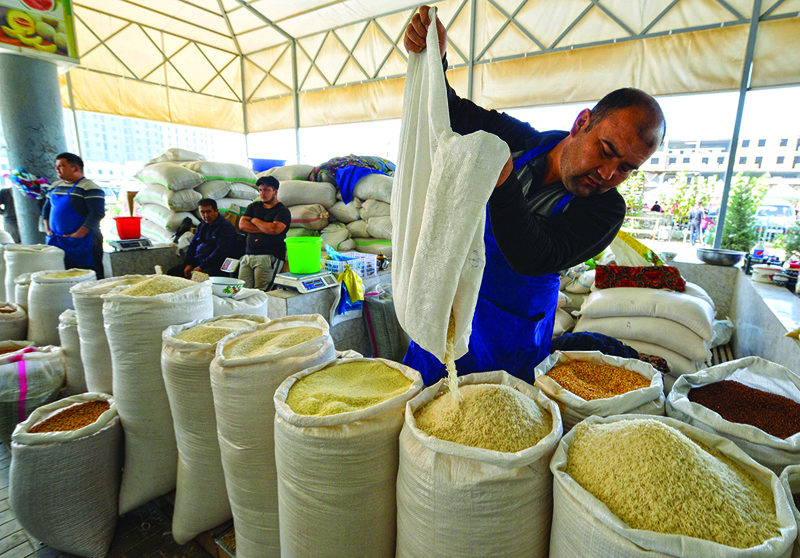 Chef Abdurahim Mirzayev, 59, cooks plov - a dish known around the world as pilaf, in a small cafe in Tashkent.—AFP photos
Chef Abdurahim Mirzayev, 59, cooks plov - a dish known around the world as pilaf, in a small cafe in Tashkent.—AFP photosThe sweet-flavored, yellow carrots grown by Uzbek farmer Mukhtor Gazatov are a key ingredient in his country's national pilaf dish-but extreme weather has devastated this year's harvest. Cooked with meat, onions, rice and plenty of oil, the carrots are a must-have to make Uzbekistan's beloved plov, a staple in the Central Asian country of 35 million people. "They are sweeter than the orange kind and lend a special flavor," the 60-year-old told AFP at his farm outside the isolated republic's capital. But one of the worst droughts in years has hit the ex-Soviet region.
Gazatov's crops were ruined while shoppers grumble over carrots that are four times more expensive than before, pushing up prices of a plate of plov. "When the weather is that hot, some carrots simply burn out. The carrots that survive are smaller," said Gazatov, whose annual income fell by a third. City temperatures surged past 40 degrees Celsius (104 degrees Fahrenheit) in early June-a month when readings are typically in the mid-30s or lower. Unseasonably cold weather earlier in the spring had already delayed the harvest and compromised its quality, causing carrots to crack, Gazatov lamented. Scientists link such shifting weather patterns and extreme temperatures to the effects of climate change.
 A man sells rice for plov - a dish known around the world as pilaf, at a bazaar in Termez.
A man sells rice for plov - a dish known around the world as pilaf, at a bazaar in Termez.Whole lotta plov
In the capital Tashkent, it is not hard to see where the demand for Gazatov's crop is. Restaurants with plov-heavy menus are dotted throughout the city, whose region is one of several that claim to make the best version of the dish. Plov is served at weddings where ingredients are cooked in massive cast iron pots. Thursdays are earmarked for plov-making followed by love-making in married households-according to legend, at least. Plov's prominent role in public life motivated the government's decision last year to create a "plov index", echoing the Big Mac index used as a measure for the cost of living in other countries.
In the first nine months of this year the price of plov in Tashkent rose by nearly 30 percent, according to the index, due to steadily rising prices for meat and the explosion in carrot prices. Navruz Khurramov, an expert with the EastFruit information and analytics platform, said this year's climate swings had compounded rising costs observed from the beginning of the coronavirus pandemic. "Uzbekistan had non-beneficial weather conditions, which limited this year's harvest. Local prices were also affected by the high prices in markets connected to Uzbekistan like Russia" where not enough carrots were planted, Khurramov told AFP.
Water scarce-region
Uzbekistan is the most populous country in Central Asia, and looks to rivers that rise in Kyrgyzstan and Tajikistan to feed its massive agriculture sector. In recent years the government has aimed to reduce areas sown for water-thirsty crops like cotton as well as the rice used in plov, while seeking out more water-efficient methods of irrigation. A growing population and shrinking glaciers in its upstream neighbors have added urgency to these efforts. This summer water was particularly scarce, offering a snapshot of a potential future where many types of farming become unsustainable and prices run away from incomes.
Neighboring Kazakhstan's decision to restrict exports of animals and feed after a mass drought-related cattle die-off added to the pressure on prices at Uzbek markets. If there is a check on rising prices for plov's ingredients, it is the ruthless competition between eateries focused on a single meal. Abdurahim Mirzayev, a 59-year-old career plov chef, said that he chose to sacrifice profits this year to ensure his rough-and-ready restaurant on the outskirts of Tashkent was full every lunchtime. His version of the dish, known as "wedding plov" or "holiday plov", is embellished with raisins and chickpeas.
But carrots are essential to plov's distinctive aroma and cannot be replaced, he said. "You have to make plov with love and from a pure heart," Mirzayev said, his hands moving quickly through pockets of steam from the meat and vegetables sizzling in the pot. Javokhir Djamoliddinov, deputy director of the national statistics committee that maintains the "plov index", said he believes Uzbekistan will always find a way to serve its favorite dish. He pointed hopefully to a recent dip in prices for carrots and government action to control food prices in general. "We have always eaten plov," he said, "and we will always eat it in the future." - AFP









